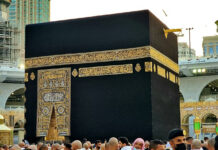By Imam Murtadha Gusau
In the name of Allah, the Most Beneficent, the Merciful All praise is for Allah. We praise Him, we seek His aid and we ask for His forgiveness. We seek Allah’s refuge from the evils of ourselves and from our evil actions. Whosoever Allah guides, there is no one who can misguide him; and whosoever Allah misguides, there is no one who can guide him.
I testify that none has the right to be worshipped except Allah, alone, who has no partner; and I testify that Prophet Muhammad (Peace be upon him) is His servant and Messenger.
Read More:Virtues-greatness-and-importance-of-the-first-ten-days-of-dhul-hijjah
Dear brothers and sisters, Shaikh Muhammad bin Salih al-Uthaimin (rahimahullah) said:
“The ten days of Dhul-Hijjah begin from the entry of the month of Dhul-Hijjah, and it ends with the day of Eid an-Nahr (Eid al-Adha), and concerning the action within them, the Messenger of Allah (Peace be upon him) said regarding it:
“There are no days wherein the righteous action is more beloved to Allah than these ten days” They (Companions) said: “O Messenger of Allah, not even Jihad in the path of Allah?” he said: “Not even Jihad in the path of Allah, except for a man who goes out with his person and his wealth, and then did not return with anything from that.” [Reported by Al-Bukhari and Muslim]
On the basis of this, I encourage my Muslim brothers and sisters in taking advantage of this great opportunity, and that they are plentiful in the performance of righteous actions during the ten days of Dhul-Hijjah such as the recitation of the Qur’an and making Zikr in its varying types: making Takbir (saying: Allahu Akbar) and Tahlil (saying: La ilaha illallah) and Tahmid (saying: Alhamdulillah) and Tasbih (saying: Subhanallah) and giving in charity and fasting and all of the righteous actions.” [See Majmu’ Fatawa, vol. 21, page 37]
• The Obligatory and Supererogatory Acts are Better in These Ten Days than in Other than Them
Imam Al-Hafiz Ibn Rajab (rahimahullah) said:
“The performance of action in the ten days of Dhul-Hijjah is better than all of the virtuous actions in other than them, and nothing is exempt from that except the best form of Jihad, and it is that a man sets out with himself and his wealth, and then he does not return with anything from either of them.” [See Fathul Bari, vol. 6, page 115]
He said likewise:
“As for the Supererogatory acts of the ten days of Dhul-Hijjah, then they are better than the Supererogatory acts of the last ten of Ramadan, likewise the obligatory acts of the ten days of Dhul-Hijjah are multiplied more than the multiplication of the obligatory acts of other than it.” [See Fathul Bari, vol. 6, page 119]
• The Performance of Hajj
Shaikh Salih al-Fawzan said:
“He (Allah), the Most High, informs that Hajj occurs in the well-known months, and they are Shawwal and Dhul-Qa’dah and the ten days from Dhul-Hijjah, and He, the Most High, said:
“Well-known.” [Al-Baqarah: 197]
Since the people know them from the time of Prophets Ibrahim and Isma’il (AS), so the Hajj – its time is known.” [See Al-Muntaqa, vol. 5, page 147]
Shaikh Abdur-Rahman As-Sa’di (rahimahullah) said:
“In the first ten days of Dhul-Hijjah is the standing in Arafah, wherein Allah forgives His servants with forgiveness that causes shaitan (satan) to grieve. For indeed; satan is not seen to be more ignoble nor more driven away than on the day of Arafah, due to that which he sees from the descending of the Angels and mercy from Allah for His servants. Likewise there occurs within them many actions from the performance of the Hajj and the Umrah; these are great affairs which are deserving that Allah should swear an oath by them (i.e. the days).” [See Taisir Al-Karim Ar-Rahman, page 923]
• Fasting the First Nine Days
Shaikh Uthaimin (rahimahullah) said:
“It is established to fast the nine days of Dhul-Hijjah, and the nine days of Dhul-Hijjah begin from the first of the days of Dhul-Hijjah and end with the ninth day, and it is the day of Arafah. The proof of its recommendation is the saying of the Prophet Muhammad (Peace be upon him):
“There are no days wherein the righteous action is more beloved to Allah than these ten days.”
And,
“Fasting is from righteous action.” [See Sharh al-Mumti’, vol. 6, page 469]
Imam Ibn Rajab (rahimahullah) said:
“From those that would fast the ten was Abdullah bin Umar (RA).”
With regard to the virtue of fasting the first nine days of Dhul-Hijjah, Imam Ibn Rajab said:
“And it is the saying of the majority of the scholars or many from amongst them.” [See Lata’if al-Ma’arif, page 353]
• Fasting on the Day of Arafah
On the authority of Abi Qatadah (RA) who said that the Messenger of Allah (Peace be upon him) was asked concerning fasting on the day of Arafah so he said:
“It expiates sins of the previous year as well as the following year.” [Reported by Muslim]
Imam An-Nawawi (rahimahullah) said:
“Its meaning is that it expiates the sins of the one who fasts it for that of two years, and the intent by that is of the minor sins, and this is similar to the expiation of the errors through performance of ablution (wudu). Thus, if there are no more minor sins, then it is hoped for a lessening from the major sins, and if there are not to be; then through the raising of the ranks.” [See Sharh Sahih Muslim, vol. 4, page 308]
• Making the Ibadah of Sacrificing an animal (Layyah)
Shaikh Uthaimin (rahimahullah) said:
“It is from the blessings of Allah upon the person that Allah has legislated for him that which he would be able to partake by way of it with the people of the season of Hajj, because the people of the season – for them is the Hajj and the sacrificial offering, and the people of the cities – for them is the sacrificial slaughter. Due to this we find by the great favour of Allah and His Mercy that He has made a share for the people of the cities from that which is for the people of the rites (of Hajj), such as avoiding taking from the hair and the nails during the ten days, in order that the people of the cities should partake with the people of Ihram by way of worshipping Allah, the Most High, through leaving off taking from these things and in order that they should partake with the people of Hajj in drawing close to Allah, the Most High, by way of the sacrificial slaughter. Since had it not been for this legislation, its slaughter would have been an innovation, and the person would have been prohibited from it, however, Allah legislated it due to these immense benefits.” [See Sharh al-Mumti’, vol. 7, page 422]
• Standing in the Night for Prayer
Imam Al-Hafiz Ibn Rajab (rahimahullah) said:
“As for standing in the night for prayer during the ten, then it is recommended, Imam Ash-Shafi’i and other than him from the scholars recommended it. When the ten days would enter, Sa’id bin Jubair would strive with such perseverance until he was barely able to manage it, and it has been reported from him that he said: ‘Do not extinguish your lamps during the ten nights.’ Worship would be admirable with him.” [See Lata’if al-Ma’arif, page 354]
• Zikr (Remembrance of Allah)
Imam Ibn Rajab (rahimahullah) said:
“As for the recommendation in being plentiful in the remembrance (of Allah) within them; then the saying of Allah, the Mighty and Majestic points to that:
“And they mention the name of Allah on known days.” [Al-Hajj: 28]
For indeed; the known days – they are the ten days with the majority of the scholars.” [See Lata’if al-Ma’arif, page 354]
It is important that one makes Zikr of Allah with sincerity and understanding of what he is saying, and that he does so focusing his attention on its significance and meaning, Imam Ibn al-Qayyim (rahimahullah) said:
“It is ugly on the part of the servant that with his tongue he should say: ‘Allahu Akbar’ whilst his heart is filled with the thought of other than Allah.” [See Bada’i al-Fawa’id, vol. 2, page 696]
• Supplication (Du’a)
Imam Ibn al-Qayyim (rahimahullah) said:
“And he (Peace be upon him) would be plentiful in making supplication during the ten days of Dhul-Hijjah, and during them he would command with being plentiful in making Tahlil and Takbir and Tahmid.” [See Zadul Ma’ad, vol. 2, page 395]
• Giving in Charity (Sadaqah)
Shaikh Uthaimin (rahimahullah) said:
“Righteous action is of varying types; the recitation of the Qur’an, and Zikr (remembrance of Allah) – Tasbih and Tahmid and Takbir, enjoining the good and forbidding evil, the prayer, giving in charity, dutifulness to parents and enjoining the ties of kinship, and so the righteous actions cannot be enumerated. If you gave a dirham in charity during these ten days and you gave a dirham in charity in the ten days of Ramadan, then which of them is more beloved to Allah? Charity in the ten days of Dhul-Hijjah is more beloved to Allah than the charity in the ten days of Ramadan.” [See Al-Liqa ash-Shahri, vol. 2, page 10]
Shaikh Uthaimin (rahimahullah) also said:
“It is astonishing that the people are heedless with regard to these ten days, you will find them during the ten days of Ramadan to strive hard in action, however in the ten days of Dhul-Hijjah you will barely find anyone differentiating between them and other than them. If however the person stands upright with righteous action in these ten days, in revival of that which the Prophet Muhammad (Peace be upon him) instructed by way of righteous action, then he will be upon much good.” [See Majmu’ Fatawa, vol. 21, page 37-38]
Imam Al-Hafiz Ibn Rajab (rahimahullah) said:
“Profit – profit through seizing the opportunity in these tremendous days, since there is no substitute to them nor is there a price for them, undertake – undertake with action, and hasten – hasten before the onset of the appointed time (i.e. death), before the squanderer comes to regret what he has done.” [See Lata’if
al-Ma’arif, page 366]
– Our Pious Predecessors (As-Salafus-Salih) And The First Ten Days of Dhul-Hijjah
The Excellence of The First Ten Days of Dhul-Hijjah:
Allah, the Most High stated:
“By the dawn. And by the ten nights.” [Al-Fajr: 1-2]
Imam Ibn Kathir (rahimahullah) said:
“The ten nights; what is meant by it is the ten of Dhul-Hijjah as was mentioned by Ibn Abbas and Ibn Az-Zubair and Mujahid and more than one person from the pious predecessors (Salaf) and those who came later.” [See Tafsir Al-Qur’anil Azim, vol. 4, page 459]
Imam Ibn Al-Qayyim (rahimahullah) said:
“Therefore a period of time which is inclusive of the likes of these actions is worthy that the Lord – the Mighty and Majestic should swear an oath by it.” [See At-Tibyan fi Aqsam Al-Qur’an, page 18]
Imam Ibn Rajab (rahimahullah) said regarding the excellence of these days:
“From their excellence is that Allah swore an oath by them wholly; and by some of it in particular, He, the Most High said: “By the dawn. And by the ten nights.” As for the dawn; then it has been said: He intended the type of dawn, and it has been said: the intent is the appearance of dawn or the dawn prayer or the day in its entirety – there is a difference concerning it among the Mufassirin. It has been said: what is intended by it is a specific dawn, then it was said: what is intended by it is the dawn of the first day of the ten days of Dhul-Hijjah, and it has been said: rather what is intended by it is the dawn of the last day from amongst them – and it is the day of An-Nahr. Upon the basis of all of these statements; the ten then are comprising of the dawn by way of which Allah swore an oath by. As for the ten nights; then they are the ten of Dhul-Hijjah – and this is what is correct and that which the majority of the Mufassirin were upon from amongst the pious predecessors (Salaf) and other than them. It is likewise authentically reported from Ibn Abbas, it has been reported from him from more than one standpoint.” [See Lata’if Al-Ma’arif, page 360]
Shaikh Abdur-Rahman As-Sa’di (rahimahullah) said:
“In the first ten days of Dhul-Hijjah is the standing in Arafah, wherein Allah forgives His servants with forgiveness that causes shaitan (satan) to grieve. For indeed; satan is not seen to be more ignoble nor more driven away than on the day of Arafah, due to that which he sees from the descending of the Angels and mercy from Allah for His servants. Likewise there occurs within them many actions from the performance of the Hajj and the Umrah; these are great affairs which are deserving that Allah should swear an oath by them (the days).” [See Taisir Al-Karim Ar-Rahman, page 923]
Regarding the saying of Allah, the Most High:
“And they mention the name of Allah on known days.” [Al-Hajj: 28]
Imam Al-Hafiz Ibn Kathir mentioned that Ibn Abbas (RA) said:
“The known days – they are the ten days.” [See Tafsir Al-Qur’an Al-Azim vol. 3, page 205]
Imam Al-Baghawi (rahimahullah) said:
“Meaning: the ten of Dhul-Hijjah in the saying of the majority of the Mufassirin. They are referred to as ‘known’ due to the eagerness of knowing them by way of their calculation due to the time of the Hajj occurring at the end of them.” [See Ma’alim At-Tanzil, vol. 3, page 284]
Imam Ibn Rajab said:
“The majority of the scholars hold that these ‘known days’ are the ten of Dhul-Hijjah, from them are: Ibn Umar and Ibn Abbas and Al-Hasan Al-Basri and Ata and Mujahid and Ikrimah and Qatadah and An-Nakha’i. It is also the saying of Abi Hanifah and Ash-Shafi’i and Ahmad Bin Hanbal in that which is well known from them.” [See Lata’if Al-Ma’arif, page 361]
Imam Ibn Rajab said:
“Imam Al-Bukhari reports in his Sahih from the Hadith of Ibn Abbas that the Prophet Muhammad (Peace be upon him) said:
“There are no days wherein the righteous action is more beloved to Allah than these ten.” Meaning the ten days. They said: “O Messenger of Allah, not even Jihad in the path of Allah?” so he said: “Not even Jihad in the path of Allah, except for a man who goes out with his person and his wealth, and then he did not return with anything from that.”
This Hadith proves that actions carried out during its days are more beloved to Allah than the carrying out of actions during the other days of the world without there being any exception from them. Therefore if they are the most beloved to Allah; then they are also the best with Him.” [See Lata’if Al-Ma’arif, page 351]
Imam Al-Hafiz Ibn Hajar (rahimahullah) said:
“That which is apparent is that the reason for the distinguished nature of the ten days of Dhul-Hijjah is due to the fact that it is the place where the main forms of worship come together; and they are: the prayer and the fasting and the giving of charity and the Hajj – and that does not appear in other than them.” [See Fathul Bari, vol. 2, page 534]
From Jabir bin Abdillah (RA) who said that the Prophet Muhammad (Peace be upon him) said:
“The best days of the world are the ten days.”
Imam Ibn Al-Qayyim (rahimahullah) said:
“They are the ten days by which Allah swore an oath by in His Book in His saying:
“By the dawn. And by the ten nights.”
Due to this it is recommended that the Takbir and the Tahlil and the Tahmid be made plentifully within them.” [See Zadul Ma’ad, vol. 1, page 56]
Imam Ibn Rajab (rahimahullah) said:
“As for the recommendation in being plentiful in the remembrance (of Allah) within them; then it is proved by the saying of Allah, the Mighty and Majestic:
“And they mention the name of Allah on known days.” [Al-Hajj: 28]
For indeed the known days are the ten days with the majority of the Scholars.” [See Lata’if Al-Ma’arif, page 354]
Imam An-Nawawi (rahimahullah) said:
“Know that it is recommended to be plentiful in making Azkar (remembrance of Allah) during these ten days – in excess of other than them. It is likewise recommended to do that on the day of Arafah more-so than the rest of the ten days.” [See Al-Azkar, page 209]
Imam Al-Bukhari reports in his Sahih that Ibn Umar and Abu Hurairah (RA) used to go out into the market during the ten days and would make the Takbir and so the people would also make the Takbir due to their Takbir. [See Sahih Al-Bukhari, vol. 2, page 457]
Imam Al-Baihaqi reports that when the ten days would enter; Sa’id bin Jubair (rahimahullah) would exert himself with immense exertion that was such that he was barely able to perform it. [See Shu’ab Al-Iman, vol. 3, page 354, no. 3752]
Imam An-Nawawi (rahimahullah) stated:
“It has reached us from Salim bin Abdillah bin Umar (RA), that he saw a petitioner asking from the people on the day of Arafah, so he said: ‘O feeble one! On this day is other than Allah, the Mighty and Majestic to be asked from?’” [See Al-Azkar, page 210]
Imam Abdur-Rahman Ibn Abi Hatim said: I heard my father (Abu Hatim Ar-Razi) say:
“I came to Yahya bin Ma’in during the ten days – the ten of Dhul-Hijjah, and with me was something written down – meaning the names of those that transmit the narrations, and so I would ask him (concerning them) in secrecy, and he would respond to me. So when I exceeded much upon him he said: ‘is it written down with you?’ I said: ‘yes’, so he took it and looked at and then said: ‘on days such as this? And the mention of people within them?’ then he refused to answer me (my questions). He said: ‘If you had asked me something from your memory; I would have answered you, as for you having it in writing; then I dislike it.’” [See Jarh wat-Ta’dil, vol. 1, page 317]
Sa’id bin Jubair (rahimahullah) would say:
“Do not extinguish your lamps during the ten nights.” Worship would be admirable with him; and he would say: “awaken your servants so that they may take the pre-dawn meal in order to fast the day of Arafah.” [See Siyar A’lam An-Nubala, vol. 4, page 326]
• Brief Qualities of the First ten Days of Dhul-Hijjah
Imam Ibn Al-Jawzi (rahimahullah) listed the qualities and virtues of the first ten days of Dhul-Hijjah, he said regarding them:
1. Allah, the Mighty and Majestic swore by them, for He said:
“And by the ten nights.” [Al-Fajr: 2]
2. Allah the Most High called them the known days, He the Almighty said:
“And they mention the name of Allah on known days.” [Al-Hajj: 28]
Ibn Abbas said:
“They are the ten days.”
3. The Messenger of Allah (Peace be upon him) bore witness for them that they are the best days of the world.
4. Allah the Almighty encouraged the performance of good deeds within them.
5. Allah the Most High commanded with the abundance of Tasbih, Tahmid and Tahlil within them.
6. Within them is the day of Tarwiyyah.
7. Within them is the day of Arafah – and fasting it is tantamount to the expiation of the sins of two years.
8. Within them is the Lailatul-Jam’i (the night of gathering) – and it is the night of Muzdalifah.
9. Within them is the Hajj which is a pillar from the pillars of Islam.
10. The occurrence of the animal sacrifice (Layyah) which is a distinguishing characteristic of the Abrahamic way as well as the Muhammadi legislation. [See At-Tabsirah, vol. 2 page 130-131]
O Allah! Forgive our sins, purify our hearts and safeguard our chastity. Oh Allah! Make every single aspect of our life be for You and in service of all your creation, irrespective of their race, tribe, region or religion. Oh Allah! Remove all false intentions that we have. Oh Allah! save humanity from being its own enemy. Protect your creations from oppression. Save our country and all the people of Nigeria from internal and external oppressors, and give them justice. Oh Allah! Protect us all from violence, fear and danger, You are our Protector. Oh Allah! increase us in beneficial knowledge, let this knowledge be with sincerity, not for seeking fame, glory, status or material wealth. Let this knowledge serve your cause in a way that you accept, and let it benefit humanity. Oh Allah! Safeguard
and protect our children and all the children of the world from evil people, they are surrounded by so much temptation and forbidden things, protect them our Lord from all of the evil influences that are around them, give them friends who will strengthen their iman (faith) and help them stay on the straight path, ameen.
All praise is due to Allah, Lord of the worlds. May the peace, blessings and salutations of Allah be upon our noble Messenger, Muhammad, and upon his family, his Companions and his true followers.
Murtadha Muhammad Gusau is the Chief Imam of Nagazi-Uvete Jumu’ah and the late Alhaji Abdur-Rahman Okene’s Mosques, Okene, Kogi State, Nigeria. He can be reached via: gusauimam@gmail.com or +2348038289761.
This Jumu’ah Khutbah (Friday sermon) was prepared for delivery today, Friday, Dhul-Qa’dah 25, 1441 A. H. (July 17, 2020).























